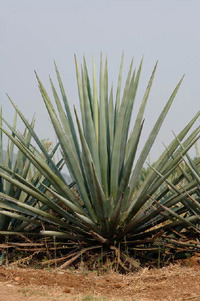
|  |  |  Entertainment | Restaurants & Dining | March 2009 Entertainment | Restaurants & Dining | March 2009  
How to Sound Smart About Tequila
 Charles Cowdery - Chicago Examiner Charles Cowdery - Chicago Examiner
go to original


| | (TequilaSource.com) |  |
Spirits drinkers like a little mystery with their drinks, so myths about distilled beverages die hard. No spirit has had more mystery attached to it than tequila.

You can sound smart either way, by dishing out the myths or by debunking them. The choice is yours.

Tequila became popular in the United States during the psychedelic 60s. To many of us back then it seemed like another drug, more akin to acid than to familiar drinks such as bourbon or gin. Many swore that tequila produces a different kind of high.

It doesn’t.

Contrary to one popular myth that persists to this day, tequila does not contain mescaline, a hallucinogenic drug derived from the peyote cactus. The alcohol in tequila is plain old ethanol, just like the alcohol in beer, wine, bourbon, vodka and everything else we drink. How drunk you get from it is strictly a function of how much you consume.

Like all distilled spirits, tequila is produced initially by fermentation, then concentrated through distillation.

With tequila, the source of fermentable sugar is the agave azul (blue agave), a member of the lily family. Like the grains from which whiskey and vodka are made, the agave piña is mostly starch and is cooked to convert it into sugar.

The name “tequila” is controlled by Mexican law. To be called tequila, the agave azul must be grown in the Tequila Region, which encompasses Jalisco and parts of some other states. Guadalajara is the capital of Jalisco and the town of Tequila is just to the north and west of there. If you go southwest instead of northwest, you get to the beach resort town of Puerto Vallarta.

As with most distilled spirits, there are several different grades of tequila, starting with two basic types.

Officially, the first type is just “tequila,” but it is often called mixto (mixed) tequila. Mixto tequila may contain alcohol made from sources other than official Tequila Region agave azul, up to 49%. It may come from any source, but usually comes from sugar cane.

The other type is 100% agave tequila. If the label does not say 100% agave it probably isn’t.

Both mixto and 100% agave tequila can be either blanco, reposado or añejo. There is a fourth category, called oro, that applies to mixto tequila only.

Blanco tequila (in English, “white” or “silver”) is the clear spirit straight from the still.

Oro tequila (in English, “gold”) is mixto tequila that has been improved through the addition of caramel, and other flavorings and colorings. Since there is no 100% agave oro, if you see the words “oro” or “gold,” it’s mixto.

Reposado (rested) tequila is aged in white oak barrels for two months to a year.

Añejo (aged) tequila is spirit that has been in wood for more than a year. Añejo tequila that has been aged for at least 8 years is called reserva.

In the North American Free Trade Agreement (NAFTA), the United States recognized tequila as a distinctive product of Mexico, and Mexico gave bourbon and Tennessee Whiskey the same respect.

Although a 100% agave reserva tequila will probably be the most expensive type on the shelf, that doesn’t necessarily mean it’s the best. The different styles are just that, different styles, not necessarily a good, better, best.

For me, for example, a 100% agave reposado is just the thing. |

 |
|  |



